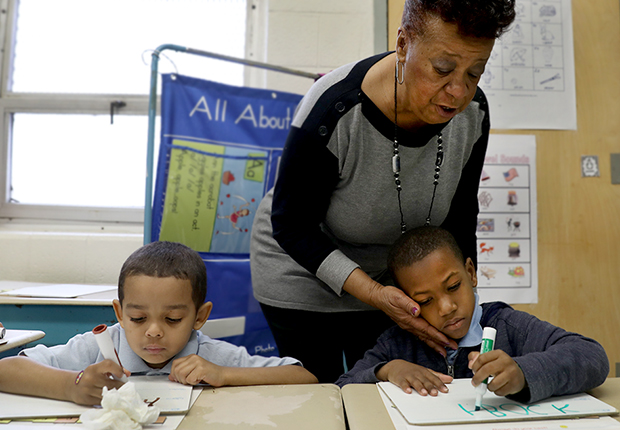AARP Hearing Center

By Thomas Ferraro
At 70, Veronica Henson serves on the front lines in the fight against poverty as a volunteer at Baltimore’s Furley Elementary School. She teaches kindergartners how to read.
“Children need to know that someone cares,” said Henson, who tutors the students, including some from low-income families, one-on-one and in small groups. “A lot of them need help. I feel this is my calling.”
The stakes are high. Research shows that children who can’t read proficiently by third grade are four times as likely to drop out of high school. That means they are also more likely to fall into poverty.
“Education is vital,” said Henson. “Without it, you are almost destined for failure.”
For 40 years, Henson taught in elementary and middle schools and at a correctional facility where many inmates had reading difficulties. She is now a volunteer with AARP Foundation Experience Corps, which has nearly 2,000 tutors 50 and older nationwide.
From varied backgrounds, including education, business and health care, they teach reading to more than 30,000 students a year at high-need elementary schools (mostly kindergarten through third grade) in 21 cities.
The Experience Corps program in Baltimore is the nation’s largest. Volunteers receive 24 hours of training and commit to 10 to 15 hours a week in the classroom. Begun in 1998, the program now has 281 volunteers in 27 schools and one after-school program.
During the 2014-15 school year, it served 7,689 students. That year, 84 percent of teachers surveyed said the volunteers had a “moderate” or “strong” influence on student reading.
A 2009 multicity study found that children working with Experience Corps volunteers made 60 percent more progress in reading comprehension than those without tutors.
Volunteers also benefit
When students read better, their self-esteem rises and their attendance and behavior improve. Studies show volunteers also experience improved mental and physical health. “We are making a real difference on so many levels,” said Bill Romani, director of Experience Corps Baltimore.
Carl Matthews, 64, tutors first graders at Arlington Elementary School. “I’m old enough to have seen a lot of these antipoverty programs come and go,” Matthews said. “This works. It’s teaching kids how to read. It’s going to change their lives.”
Last year, Matthews was unable to tutor for several months while caring for his ailing wife. “My wife told me, ‘Go back. The children miss you. You’ll feel better,’ ” Matthews said. “I went back, and they hugged me.”
Emily Hunter, Arlington’s principal, praised the volunteers: “They are seen as grandparents. They add warm and fuzzy to our school. It makes kids want to come to school and learn.”
Hank Greenberg, AARP Maryland state director, said the program inspires volunteers “to serve in their community and disrupt the cycle of poverty by making a lasting difference in the lives of America’s most vulnerable children.”
On March 31, Experience Corps Baltimore will hold its Senior Prom, a celebration to raise money, retain volunteers and recruit new ones. “We need more Experience Corps people,” Henson said.
To RSVP or learn more about the program, call Experience Corps Baltimore at 443-278-9400.
Thomas Ferraro is a writer living in Davidsonville, Md.































































